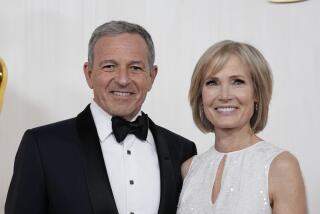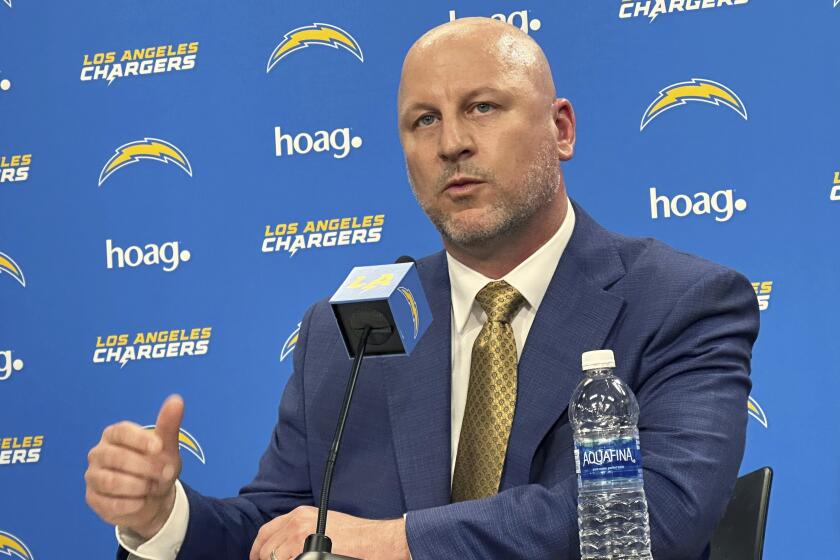S.F. Giants Owner Agrees to Sell to Tampa Bay Group
Owner Robert Lurie of the San Francisco Giants, frustrated over the repeated failure of Bay Area voters to approve financing of a new stadium, said Friday he has agreed to sell the team to a Tampa Bay syndicate that will move it to the Suncoast Dome in St. Petersburg, Fla., for the 1993 season.
Lurie refused to go beyond a statement in which he confirmed that a memorandum of agreement had been reached during a meeting in San Francisco on Thursday and that he would not receive any other bids for the team while the offer goes through the process of approval.
A group of five investors will pay a reported $110 million for the Giants, who joined the Dodgers in pioneering major league baseball on the West Coast when the teams moved out of New York after the 1957 season.
Lurie said in his statement that he hopes to receive approval of the sale at a major league owners meeting in St. Louis on Sept. 9.
But Fred Kuhlmann, vice chairman of the St. Louis Cardinals and chairman of the major league ownership committee that presents recommendations on all sales to the full ownership, said Friday “it is not clear” that his committee can act that quickly.
And in San Francisco, Mayor Frank Jordan said, “This deal is not done,” and vowed to present a competing offer from local investors that he hopes will derail the team’s move to Florida.
“San Francisco does not agree to sell the Giants to Tampa Bay,” an uncommonly somber Jordan said during a packed news conference at City Hall. “I can tell you I’m not going to let it happen without a fight.”
While refraining from attacking Lurie directly, the mayor expressed anger that the Giants’ owner would sell the team while a coalition of San Francisco investors was working on a bid to keep the ballclub in town.
Jordan said the coalition asked for the team’s financial records about three weeks ago in order to calculate a “fair market value offer” for the club. The records were turned over last Friday, and Jordan said the investors were still plowing through the documents when the Tampa-St. Petersburg deal was struck.
The mayor, declaring that the loss of the Giants would be a $30-million-a-year disaster for San Francisco, said he has no doubt the group can come up with enough money to match the Florida offer.
But an official at the city’s Chamber of Commerce was less optimistic.
“People we’ve heard from say that if the offer really is $110 million, that’s a pretty good price,” said Carol Piasente. “We don’t know how likely it is that the local group would be able to match it.”
The sale requires the approval of 11 of the 14 National League teams and eight of the 14 American League teams. The majority approval in the American League could be a problem, since a move to the Tampa Bay area by the Giants would allow the National League to sew up the new and potentially lucrative Florida market. The National League is expanding next year with teams in Miami and Denver.
Carl Barger, president of the Miami team, the Florida Marlins, said Friday he would “welcome and support” another National League team in Florida.
American League president Bobby Brown refused to comment, but Chicago White Sox co-owner Jerry Reinsdorf suggested that his league would probably approve the move.
“What we have to look at is what’s good for baseball and not get caught up in a league-vs.-league controversy,” he said.
A spokesman for Commissioner Fay Vincent, who was camping in Maine, said Vincent would not comment until he had more information on the proposed sale.
Vincent, responding a few days ago to a hypothetical question about the possibility of the Giants’ move to Florida, said he did not think the American League would object, since that league’s Oakland Athletics would be the only team remaining in Northern California, where there has always been a question about the area’s ability to support two major league teams.
Although a National League owner who requested anonymity said Friday that there is sentimental reluctance in his league to giving up San Francisco, the one National League team likely to voice strong opposition is the Dodgers, who would be losing their historic rival if the Giants went to Florida.
Dodger owner Peter O’Malley was returning to Los Angeles from the Olympic Games in Barcelona on Friday and could not be reached for comment.
His team could be touched in another way as well. The group attempting to buy the Giants includes Vince Piazza, owner of the Piazza Management Co. of Conshohocken, Pa., near Philadelphia.
Piazza is a lifelong friend of Dodger Manager Tom Lasorda. Conceivably, Lasorda could be in line for an executive position with the Giants if they move to Florida, providing both Lasorda, who has one year left on his managerial contract, and the Dodgers find a dignified way to end his 16-year tenure as manager. Piazza is also the father of Los Angeles catching prospect Mike Piazza, who is Lasorda’s godson.
The group of prospective buyers is headed by Vince Naimoli, president and CEO of Anchor Industries Inc. of the Tampa Bay area, and includes Vince Triendi, president and CEO of Phoenix Technology Inc. of Valley Forge, Pa.; J. Rex Farrior, a Tampa attorney, and Mark Bostick, who operates a transportation company in the Tampa Bay area.
The proposed sale complicates the ongoing issue of National League realignment in 1993. Vincent recently overrode the objections of the Chicago Cubs and used his “best interest of baseball” authority to order the Cubs and Cardinals to join the new Colorado Rockies in the National League West next year, with the Cincinnati Reds and Atlanta Braves moving to the East Division with the Miami-based Marlins.
The Cubs sued Vincent to block the mandated move and won a temporary restraining order in a Chicago federal court. Vincent has appealed, with a decision expected late this month. If the Cubs successfully block realignment, and the Giants move to Florida, three Eastern time zone teams--the Giants, Reds and Braves--would play in the National League West.
Stanton Cooke, the Cubs’ chairman, said Friday that the proposed sale does not alter the Cubs’ objection to realignment and their contention that Vincent exceeded his authority. He said the Cubs will let the situation “play itself out.”
National League Vice President Katy Feeney, who heads the league’s scheduling committee, said the possibility of moving the Florida-based Giants from the West Division to the East would probably require a new vote on realignment.
She said that none of the theoretical schedules her committee has formulated, pending a final decision on realignment, include the Giants playing in St. Petersburg, and “that throws a whole new issue” into a maze that is so time-consuming and complicated it may delay realignment itself.
Nothing, however, diminished Friday’s excitement in Florida.
“Everybody in Tampa Bay should feel like they’re running the bases on air today,” St. Petersburg City Manager Rick Dodge said at a news conference at the Suncoast Dome, which opened in March, 1990, and has been used as a wedge more than once.
The Chicago White Sox were on the verge of moving there before the state of Illinois provided funding for the new Comiskey Park. The National League considered it as an expansion site before settling on Miami and Denver. There was some belief that the Seattle Mariners would move there, but the club remained in Seattle when major league owners finally approved its sale to a group that included Japanese investors.
Said Jack Critchfield, chairman of Florida Progress, a group lobbying for a major league team in the Tampa Bay area: “I never felt confident we were going to get the Mariners for various reasons, but I feel awfully confident about this one.”
The Giants have played at cold and windy Candlestick Park since 1960. Lurie, who became majority owner in 1976, has said repeatedly in recent years that he does not consider it a major league facility. His quest for a publicly financed stadium has been defeated by voters four times--twice in San Francisco and twice in the San Jose area.
The latest rejection, by San Jose voters in June, prompted him to say he would never again face the emotional gantlet of another election and that, although he hoped to keep the team in San Francisco, he was receptive to any offers.
He has been supported in that by Vincent, who has repeatedly voiced his opposition to moving franchises--no major league club has moved since the Washington Senators became the Texas Rangers after the 1971 season--but who also said the Giants met his criteria for moving based on a substandard stadium and a lack of Bay Area interest as evidenced by the absence of support in the four elections.
Lurie’s Candlestick lease runs through 1994, but he received the city’s permission to leave any time before that when the stadium issue went before San Francisco voters for a second time in 1989.
Lurie met with club employees at Candlestick on Friday and said, according to one, that he had no option but to sell to an out-of-state group because he had no proposals from the Bay Area.
San Francisco businessman H. Irving Grousbeck, who recently notified Lurie that he might be interested in buying the team but would need three or four weeks to decide, said Friday:
“I’m disappointed personally and for all Giants fans in the Bay Area.”
On the city’s fog-shrouded streets Friday, news of the team’s sale spread quickly. A banner headline in the afternoon newspaper said it all: “Giants: Bye-bye, baby,” it blared.
Many residents said they were not surprised by Lurie’s move, but most were dismayed that local leaders had been unable to find a way to keep the team.
“What a complete and total drag,” said Tom Alexander, a college student who goes to about 20 games a year. “It just amazes me that a city like this could let this happen.”
At the Giants Dugout, a downtown ticket and souvenir shop, business was brisk--but the mood was grim.
“I’m incredibly shocked,” said Jordi Honey, 14. Honey, like many fans, said he wasn’t sure who he would root for if the Giants left. But one thing was certain, he noted: it “definitely won’t be the Oakland A’s.”
Friday’s news came just days before a task force led by San Francisco Supervisor Angela Alioto was expected to unveil a plan to raise money for a new downtown stadium for the Giants.
Alioto said she would press forward with the effort despite Friday’s developments.
“I’ve been working on this for eight months . . . to make Bob (Lurie) happy,” she said. “I’ve been coming up with $130 million to build a ballpark, not buy a team.”
Times staff writers Jenifer Warren and Jonathan Weber in San Francisco contributed to this story.
RELATED STORY: C1
More to Read
Go beyond the scoreboard
Get the latest on L.A.'s teams in the daily Sports Report newsletter.
You may occasionally receive promotional content from the Los Angeles Times.










